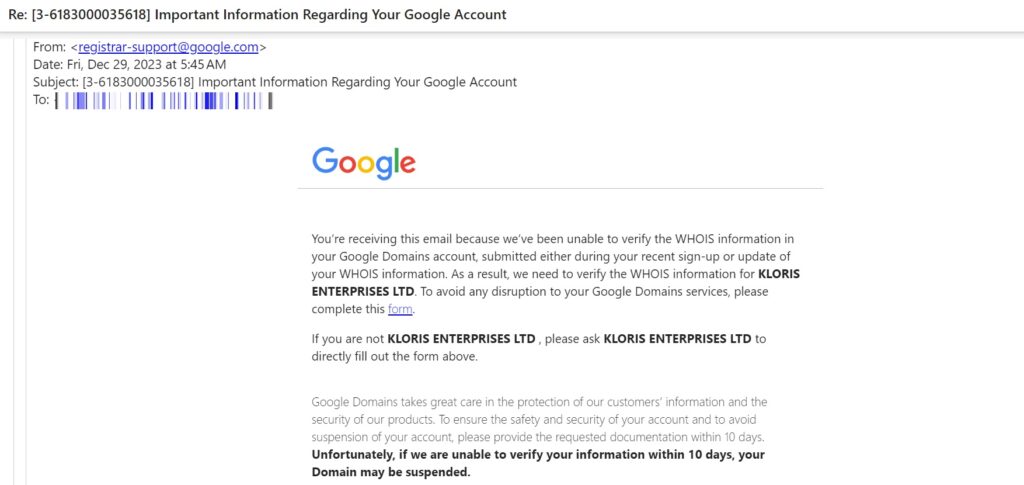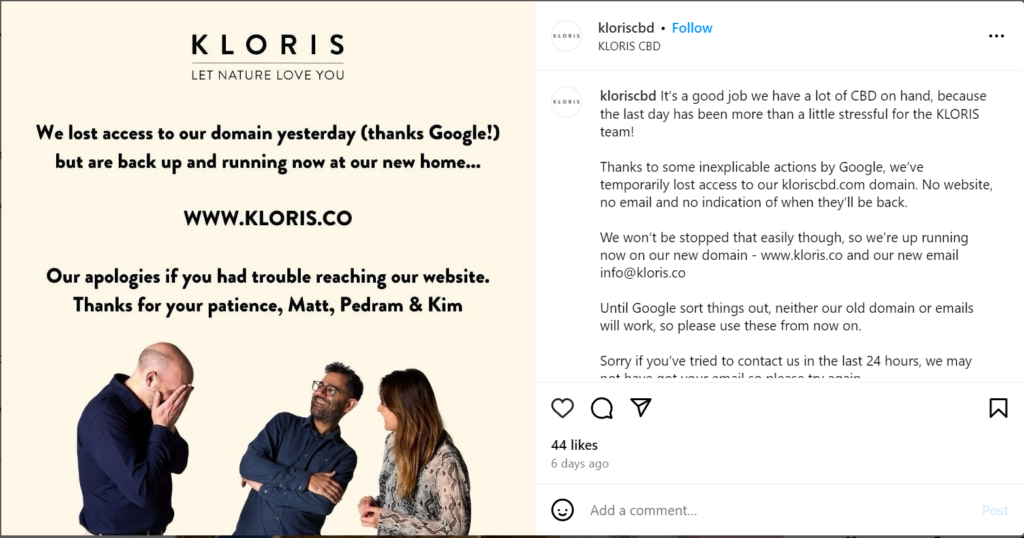The worst happens: you log on and find that your website, and other essential functions, are gone. But what do you do if you lose your domain?
This can happen because your domain has been hijacked, it’s expired or there could be complications during a transfer.
In this article, we’ll be exploring what can happen if you lose your domain and how to recover if it happens to you.
First, let’s run through some definitions.
Domain: An address that you use to access a website
Registrar: Where you register and renew domains
WHOIS: A place where you can find out the information around people, groups or organisations who own a domain name
SSL: Now replaced by Transport Layer Security (TLS), SSL/TLS is an encryption security protocol. You’ll recognise it as ‘https’ at the start of a URL rather than ‘http’
What can happen if you lose your domain?
If you lose your domain, you’ll lose access to your website (and possibly your emails) as well as experiencing a drop in search engine rankings, orders and potential new customers.
Pedram Mershahi, co-founder of Kloris CBD, talks to Small Business about how a verification email from Google turned into a nightmare for his business.
For background, Google Domains has been sold to Squarespace. The announcement was made in June 2023, affecting 10m domains. Unless users change their domain, they will be transferred over to Squarespace.

I have two email addresses registered with Google for my Google Domains account. A validation email (below) was sent to my secondary email on December 29, 2023 – right between Christmas and New Year – and went straight into my spam folder. They then suspended our account on January 17, 2024, without any further communication with us.

Having regularly checked our Google Domains dashboard and primary emails (all Google-based), there wasn’t a single notification to say there were any issues. In fact, all of their systems have been showing that our Google domain is verified and fully operational.
They should not shut down business domains and emails without contacting a company through their main websites or domain portals and dashboards. Because, crucially, shutting down business domains and emails of independent companies has the very real danger of sending businesses bankrupt very quickly. This obviously means people losing their jobs. We have full time staff wages that we are responsible for, not to mention a host of freelancers and external supplier contracts to honour.
For the past seven days (up to January 24, 2024), we’ve been going back and forth with Google. We had to move our domain from kloriscbd.com to kloris.co. We received a ‘Congratulations! You’ve got your domain’ and our primary emails back from Google on January 23, 2024, but we had effectively been wiped off the face of the internet as a business.
How it’s affected our business
Hard-earned rankings are the main ongoing issue now. Five years of work to build up our ranking has been undone in less than a week, as we’ve lost all the domain authority that we’ve built. With our email being down, we have also lost some wholesale customers. Google’s incompetent infrastructure in this acquisition has threatened to ruin a number of people’s livelihoods. If this sale has affected 10m domains then we cannot be the only business this has impacted so negatively. They must take responsibility for that.
It’s been incredibly stressful too. The insomnia has been the worst thing – I have epilepsy and sleep deprivation is the biggest trigger for seizures.
I can easily say the last seven days have been the hardest – and not just for me. It’s put a strain on my partners Kim and Matt, who co-own the business. This stress has put a huge strain on the entire team, especially with young families to look after.
We’re waiting on another email back from Google [at the time of publication] to see what they can do to restore our rankings and presence in search engines, but we fear it will be another automated email, which means more time (and earnings) lost.
They (Google) seem untouchable. They would say it’s your fault or your responsibility to check your spam folders. We couldn’t even access our primary email account because it was blocked from accessing much of the information they had requested, so it really is a crazy scenario that they expect businesses to navigate through.
Help from the community
Our customers and community have been so supportive. Customers have stepped up and helped us through social media support as well by buying our products, tagging their friends and sharing messages of support. We are genuinely overwhelmed by how kind our customer base have been.

To help rebuild, we’ve offered 20 per cent off orders, plus free gifts, for customers who use a discount code.
The advice I would give small businesses is to remember to check the spam, even on your secondary email accounts. A big issue is that a lot of Google emails look like phishing emails, so you have to really check and check again.
Small Business approached Google and Squarespace for comment but they have yet to respond.
However, in a response to an information request from us, founder and CEO of Trio CEO, Conor Gillivan, got in touch.
One of my clients nearly missed important deadlines during this process because important emails landed in their junk folder as their domain transfer was pending. We luckily caught the issue in time. My recommendation is to monitor communications through the changeover vigilantly. Also, confirm your contact and payment details are up-to-date in your Squarespace account. Take the opportunity to review your domain and DNS settings as well.
Squarespace has stated pricing for existing domains will hold steady for one year. Considering my years of experience assisting businesses online, I expect the technical domain handoff process to go smoothly for most.
What to do if you lose your domain unexpectedly
We’ve asked some of the experts what you should do if you lose your domain.
Huw Ramsey, technical director at Kaweb
A domain name dropping off the gird can be extremely stressful – especially if it’s business critical – and what domain isn’t these days?
The first thing to do is establish who the registrar is for the domain – this is the body that secures the domain and renews it. Logging in to their control panel (if you have access) or contacting them and asking them for more information on its status will help ascertain next steps. The domain type will dictate what to do next as different domain types have unique processes as to what happens should they expire, for example. Performing a WHOIS search online, via tools such as https://whois.domaintools.com/ will give you more information as to the Registrar and Name Servers (which may help you track down who has access to the domain in order to renew).”
“The first thing to do is establish who the registrar is for the domain”
Huw Ramsey
Peter Wood, chief technical officer at Spectrum Search
First and foremost, communication is key. If your domain, including email, is suspended, it’s crucial to promptly inform stakeholders using alternative communication channels. Whether it’s through social media, temporary email services, or even traditional methods like phone calls, maintaining transparency with your customers, partners and employees, this can mitigate the reputational damage.
Simultaneously, initiate a domain recovery process. Contact your domain registrar immediately to understand the cause of the suspension. It could range from administrative oversights, such as expired registrations or unattended policy violations, to more complex issues like security breaches. Understanding the root cause is pivotal in formulating an effective recovery strategy.
If recovery seems prolonged, securing an alternative domain through a reputable provider is a prudent step. This, however, is more than a stopgap solution; it’s about ensuring business continuity. When selecting this alternative domain, it’s essential to choose a name that’s intuitive for your current users, thereby minimising confusion and maintaining brand recognition.
From a technical standpoint, leveraging automation and AI (artificial intelligence) can be a game-changer in these scenarios. Integrating AI and ML (machine learning) tooling can significantly streamline and accelerate recovery processes. Automating certain aspects of your digital infrastructure can not only aid in swift domain transition but also bolster your overall digital resilience.
Finally, this incident should be a catalyst for a thorough review of your digital assets and security policies. Implementing robust security measures, regular back-ups and a comprehensive disaster recovery plan is imperative. As someone who has extensively worked with emerging technologies, I cannot over-emphasise the importance of proactive risk management in safeguarding your digital presence.
“It’s crucial to promptly inform stakeholders using alternative communication channels. Whether it’s through social media, temporary email services, or even traditional methods like phone calls, maintaining transparency with your customers, partners and employees can mitigate the reputational damage”
Peter Wood
Chelsea Hopkins, social media and PR manager at Fasthosts
First of all, check if you have some form of back-up of your site so that when you do get your domain back or find a new provider you can get back online as soon as possible – this is one of the many reasons why having your site backed up is extremely important.
If you still have email access, have a look through to see if you’ve missed any emails from your provider that could indicate what’s gone wrong. This could be anything from an upcoming renewal date or a message that a domain is set to expire if you’re renewing manually – the vast majority of web hosts won’t suspend or delete your domain without prior warning.
If you do end up with no option of recourse and have to find a new provider, don’t rush into it, however tempted you may be. Do your research to make sure you’re getting the right deal for you and your business, as the long-term issues that could arise from choosing the wrong provider can far outweigh the short-term losses of not panic buying.
“Check if you have some form of back-up of your site so that when you do get your domain back or find a new provider you can get back online as soon as possible – this is one of the many reasons why having your site backed up is extremely important”
Chelsea Hopkins
Danielle Holmes, co-owner of Black Nova Designs
This is a very common occurrence unfortunately, and in reality, there is no coming back from it if you lose access especially if it’s not in your company name. You can occasionally request domain access by proving your identity to the registrar, which can take up to six months to validate.
The way to fix this is to always buy the domain name yourself or from a supplier that puts the domain in your name – always.
You purchase domains yearly or sometimes biannually so it’s easy to lose access or log in details – keep them safe, or buy from a trusted supplier.
The domain is the hub of everything: emails, website, newsletters, CRMs, everything. It’s imperative that it’s registered in the company name from the beginning as rectifying these issues are time consuming, difficult and can be costly.
“You purchase domains yearly or sometimes biannually so it’s easy to lose access or log in details – keep them safe, or buy from a trusted supplier”
Danielle Holmes
Vance Tran, co-founder of Pointer Clicker
Another crucial step is to check domain marketplaces and search engines to see if your domain has been registered elsewhere in the interim. If found, the next best thing is to contact the new owner to explore negotiation with the intention to regain control.
Backordering the domain is also a smart tactic if it’s still available. This essentially puts you in line to purchase it if the new registration falls through.
For the long term, closely review any contracts with website developers regarding ownership obligations to avoid unintended transfers. Just as important is self-managing registration, using strong security measures to prevent unauthorised access that could lead to loss.
Most importantly, let’s not do a do-over: set calendar reminders well ahead of renewal dates so re-registration stays top of mind.
“Check domain marketplaces and search engines to see if your domain has been registered elsewhere in the interim. If found, the next best thing is to contact the new owner to explore negotiation with the intention to regain control”
Vance Tran
If you lose access, speak to your contacts
In short, contact your registrar if something goes wrong. Unfortunately, as Kloris CBD’s case demonstrates, you may be directed to web guides and find it near-impossible to speak to an actual human. For this reason, it’s essential to have website and email back-up in case your systems falter.
Remember that your community are around to support you as well. Let customers know what’s happening via your social media accounts, lean on fellow small businesses for advice and let your loved ones know what’s going on so that they can lend an ear.
If you’ve been affected by something like this or have any issues that you would like Small Business to investigate, please email anna.jordan@stubbenedge.com.
Read more
Choosing the right .co.uk domain name for your business – The right domain can help you attract potential customers and succeed online. And a .uk domain shows that you’re based in the UK and are a reputable business
Different domain endings – do you need to buy them all? In partnership with the UK Domain, we ask whether you really need to buy all of the domain name endings for your small business website
Why should you have a custom domain? – In partnership with the UK Domain, we tell you why you should go for a custom domain name
